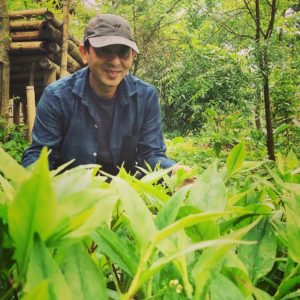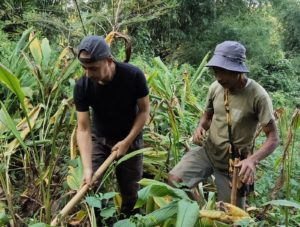By Eleanor Sangma
Local crops of the North East are being pushed off in order to make way for foreign seeds. This has led to a highly dependent system in the farming community. However, there are farmers who are determined to redefine the practice of farming.
 “I am looking at how people from the North East mainly the farming community, led by the youth can lead a life which is self-sustainable and which is more based on the inherent strong qualities of the region,” stated Samir Bordoloi, a social agripreneur and secretary general of Society for Promotion of Rural Economy and Agriculture Development (SPREAD NE).
“I am looking at how people from the North East mainly the farming community, led by the youth can lead a life which is self-sustainable and which is more based on the inherent strong qualities of the region,” stated Samir Bordoloi, a social agripreneur and secretary general of Society for Promotion of Rural Economy and Agriculture Development (SPREAD NE).
Bordoloi spoke about what he refers to as the food conspiracy, in which the local food wisdom is removed from people and they are given exotic food items. This leads to farmers becoming dependent on exotic and hybrid seeds from the corporates, he stated. All the traditional food items of North East can make an international identity, but no one realizes the same. Bordoloi stated that no agricultural or school textbooks include sections on local food, instead there is glamorization of exotic items such as strawberries, avocadoes and dragon fruits.
“The food system has been made into such a dependent technology and so costly in production, farmers don’t get profits,” he stated. The schemes and policies welcome the kind of technologies where farmers are bound to take loans, and their wives have to take up micro-finance. “Not for self-sustenance, only to buy inputs,” he added.
Bordoloi started SPREAD NE based on the principle of local people, local food and local economy. In his farm learning center in Sonapur, he has initiated a new concept called the food forest as part of what he calls compassionate farming. A food forest involves growing local crops inside a forest. It does not require such hard work or costly, high tech systems. It also does not involve clearing and burning of forests, doing less damage to the environment. “I wanted to make this because I felt that as a farmer, I don’t have the right to just destroy whole forests,” he stated. He feels it is his responsibility to assist nature as a farmer. He grows native plants and local fruits. “The process of compassionate farming and creating a food forest involves mimicking the nature,” he stated. The natural balance in the forest which allows it to grow naturally on its own without any outside disturbance is mimicked in a food forest. It yields low volume, high value crops.
 Bordoloi believes in grassroot level education and awareness. He trains the youth of the region in compassionate farming and calls them green commandos. Such young social entrepreneurs in turn, go to villages and train school children and women farmers. They also adopt the community to make low volume, high value products which require zero budget. The youth act as the bridge between the market and the farmers.
Bordoloi believes in grassroot level education and awareness. He trains the youth of the region in compassionate farming and calls them green commandos. Such young social entrepreneurs in turn, go to villages and train school children and women farmers. They also adopt the community to make low volume, high value products which require zero budget. The youth act as the bridge between the market and the farmers.
He stated that we have to make children aware that there is a world beyond white collar jobs. “Farmers are the next generation healers, because all the medicines will go resistant,” he stated. Even in the past couple of years, there has been a higher demand for food which can help people stay resistant against Covid-19. “So, it is important to glamorize the profession of farming in the kids’ mindset,” he added. His green commandos motivate young students to create food forests. These students even use the crops they grow by themselves for their mid-day meal. He said that is how they learn the whole value chain and how they fit in it. He stated that he is utilizing the fact that the younger generation has become more conscious of working with the environment, thinking for the climate and leaving less carbon footprint. “The whole process is to create a green tribe who thinks about how slow and active living is promoted in North East.” he added.
Bordoloi said he works by the 3Cs, which are Conserve, Consume and Commercialize. He aims to conserve local seeds and plants, local food wisdom, cultural wisdom and traditional knowledge. He urges people to consume by practicing slow and active living and through eating healthy. For commercialization, he said instead of providing highly technological instruments and sees, the income of farmers can be doubled through food tourism, farm tourism and village tourism.
 This form of farming, aimed to promote the lives of the hill folk, requires very less water. It is rain-fed and not dependent on costly equipment. Plants like bamboos and bananas can store water, which can also irrigate other crops. “We have also found that the practice rejuvenates the streams and ground water gets recycled,” he added. In the initial days, there were very less animals in the area. Now, there are wild boars, leopards, birds and other animals. These birds eat the fruits and litter the seeds which helps news plants crop up. “So, the ecological balance is restored,” he stated.
This form of farming, aimed to promote the lives of the hill folk, requires very less water. It is rain-fed and not dependent on costly equipment. Plants like bamboos and bananas can store water, which can also irrigate other crops. “We have also found that the practice rejuvenates the streams and ground water gets recycled,” he added. In the initial days, there were very less animals in the area. Now, there are wild boars, leopards, birds and other animals. These birds eat the fruits and litter the seeds which helps news plants crop up. “So, the ecological balance is restored,” he stated.
The agripreneur expressed his opposition to hybrids and genetically modified seeds in the name of development. “We have to grow with the local seeds and the local food wisdom,” he stated. Speaking about why he calls his work compassionate farming he said, “I feel that we are all connected together. We are growing and sharing food, and were also getting money out of that.”



